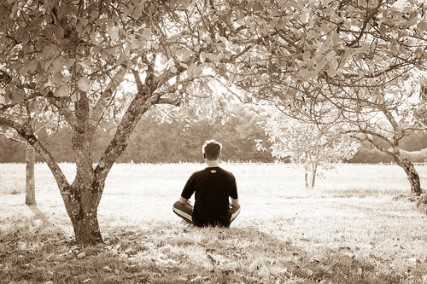
The late evolutionary biologist Stephen Jay Gould coined the phrase “non-overlapping magisteria” in 1997 to convey the idea that science and religion essentially have nothing to say about each other; that religion can’t contribute to or detract from science and vice versa. Recent collaboration between psychologists and Buddhist monks, however, seem to indicate that Gould may have been wrong, and that perhaps religion can have something to say about science.
“Mindfulness has enjoyed a tremendous surge in popularity in the past decade, both in the popular press and in the psychotherapy literature,” wrote Daphne Davis and Jefferey Hayes in a 2012 article for the American Psychological Association. “The practice has moved from a largely obscure Buddhist concept founded about 2,600 years ago to a mainstream psychotherapy construct today.”
Since original studies in the early 1990’s, the scientific community’s appreciation for the ancient Buddhist practice of meditation has been steadily increasing over the last decade, and is now penetrating more mainstream culture and media. The University of Washington professor of psychology Paul Ekman, most famous for his work on facial micro-expressions and lie-detection, has lectured and written extensively about emotion and the value of mindfulness, also coauthoring a book with the Dalai Llama. Meditation expert Andy Puddicombe gave a 10-minute lecture on the subject on the internationally acclaimed website TED, accompanied by some illustrative juggling feats, and Richard Burnett gave another TED talk in February about the potential educational application of mindfulness. Even more recently, the magazine Scientific American Mind featured an article (dominating the front page) about the power and benefits of mindfulness in its March-April 2013 issue.
Summarized, the scientific research says essentially what the Dhammapada—a poetic collection of teachings and sayings of the Buddha—has said since the third century BCE: “The wise man, by vigor, mindfulness, restraint, and self-control, creates for himself an island which no flood can submerge (2:5).” The text repeatedly differentiates between the virtues of mindfulness and the dangers of negligence; just as recent psychological research has demonstrated the link between distracted living and stress, anxiety, depression and general unhappiness.
Mindfulness keeps us in the present, in the here and now without constantly evaluating and reacting to it, and the emotional benefits are profound and well-attested to.In an interview with BigThink from Nov. 2012, Ekman said that the best way to control one’s emotional reactions is to increase the length of time between an impulse and action. “Strangely enough, the only thing that seems to stretch that out is a contemplative practice called mindfulness.”
What does mindful meditation entail? According to Puddicombe, it is basically passive, introspective observation. “Most people assume that meditation is all about stopping thoughts, getting rid of emotions, somehow controlling the mind, but actually it’s quite different from that. It’s more about stepping back, sort of seeing the thought clearly, witnessing it coming and going, emotions coming and going without judgment but with a relaxed, focused mind.” Ekman and Puddicombe give different estimates of required time for mindfulness to be effective—20 minutes a day, four days a week and 10 minutes a day, every day, respectively—but both seem to agree that it’s something that needs constant practice.
Bellevue College Professor of Philosophy Tim Linneman, a practicing Lutheran and Buddhist, said that mindfulness isn’t a cure-all for suffering, but can be a useful tool for moving in that direction. “Mindfulness is not a substitute for the hard work of building virtue and tearing down vicious habits, nor for the difficult inquiry into determining what is truly best, but at the same time neither of these projects will ever be successful without mindfulness assisting.” As recent research has demonstrated, Linneman argues that the benefits aren’t limited to saffron-cloaked priests. “Joe-on-the-street will benefit from making efforts in these areas to the extent that those efforts are exerted.”
While much of the work in the field is still speculative in its phenomenological explanations, the cause-and-effect relationships between mindfulness and mental health is becoming increasingly well-documented and scientifically supported. For Linneman, the explanation is interesting but secondary in importance to effects themselves. “We might be curious as to what explains this internal mental activity as being able to cause these effects, but perhaps the first fact worth investigating is whether or not mindfulness-based therapy is in fact successful…But until we are in a position of being able to advance some generalization, the usual advice is ‘try it and see!’”









